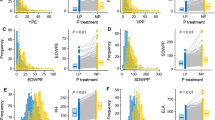Abstract
Acid soils severely reduce maize (Zea mays L.) yield in the tropics. Breeding for tolerance to soil acidity provides a permanent, environmentally friendly, and inexpensive solution to the problem. This study was carried out to determine the relative importance of additive, dominant, and epistatic effects on maize grain-yields in different tropical genotypes. Divergent selection in three populations (SA4, SA5, and SA7) provided inbred lines tolerant or sensitive to acid soils. The tolerant and sensitive lines from each population were used to obtain the F1, F2, F3, back-crosses, second back-crosses, and selfed back-cross generations. In addition, the tolerant lines from SA4 and SA5 were crossed with a sensitive line from the Tuxpeño Sequía population, from which the same generations were also derived. All generations from each of the five sets of crosses were evaluated in three acid-soil environments and one non-acid-soil environment. A generation-mean analysis was performed on each set for yield. The sequential sum of squares associated with additive, dominance, and digenic epistatic effects were used to estimate the relative importance of each genetic effect. Epistasis was not important in any set in the non-acid-soil environment, with dominance accounting for 80.76% of the total variation among generation means across sets. In acid-soil environments, epistasis was more important. The relative importance of digenic epistasis was greater in those evaluations with large experimental errors. The tolerant line from population SA5 was prone to severe root lodging, suggesting a very poor root system. Apparently, the tolerance to soil acidity in this line is not associated with a large root system.
Similar content being viewed by others
Author information
Authors and Affiliations
Additional information
Received: 3 September 1997 / Accepted: 17 November 1997
Rights and permissions
About this article
Cite this article
Ceballos, H., Pandey, S., Narro, L. et al. Additive, dominant, and epistatic effects for maize grain yield in acid and non-acid soils. Theor Appl Genet 96, 662–668 (1998). https://doi.org/10.1007/s001220050786
Issue Date:
DOI: https://doi.org/10.1007/s001220050786




